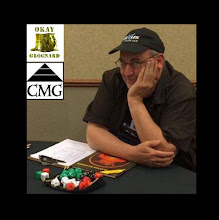The description from Board Game Geek is as follows:
In Puerto Rico players assume the roles of colonial governors on the island of Puerto Rico. The aim of the game is to amass victory points by shipping goods to Europe or by constructing buildings.
Each player uses a separate small board with spaces for city buildings, plantations, and resources. Shared between the players are three ships, a trading house, and a supply of resources and doubloons.
The resource cycle of the game is that players grow crops which they exchange for points or doubloons. Doubloons can then be used to buy buildings, which allow players to produce more crops or give them other abilities. Buildings and plantations do not work unless they are manned by colonists.
During each round, players take turns selecting a role card from those on the table (such as "Trader" or "Builder"). When a role is chosen, every player gets to take the action appropriate to that role. The player that selected the role also receives a small privilege for doing so - for example, choosing the "Builder" role allows all players to construct a building, but the player who chose the role may do so at a discount on that turn. Unused roles gain a doubloon bonus at the end of each turn, so the next player who chooses that role gets to keep any doubloon bonus associated with it. This encourages players to make use of all the roles throughout a typical course of a game.
Puerto Rico uses a variable phase order mechanic, where a "governor" token is passed clockwise to the next player at the conclusion of a turn. The player with the token begins the round by choosing a role and taking the first action.
Players earn victory points for owning buildings, for shipping goods, and for manned "large buildings." Each player's accumulated shipping chips are kept face down and come in denominations of one or five. This prevents other players from being able to determine the exact score of another player. Goods and doubloons are placed in clear view of other players and the totals of each can always be requested by a player. As the game enters its later stages, the unknown quantity of shipping tokens and its denominations require players to consider their options before choosing a role that can end the game.
Despite my efforts, I have never been very consistent with this game, nor it's card game offshoot San Juan (2004). I still have fun when I play them but somehow I'm often last or close to being last in most games of it that I play. I've tried diverse strategies and more focused ones but can't put anything like a winning score together. This is a game that has been around long enough and printed in high enough quantities that used copies can be found for a reasonable price, and will sometimes turn up at thrift stores. Try to play a few times before you buy it though and see if it is something you can manage to enjoy.
Mostly about card games and board games,
unless they have a decidedly wargamey feel.
unless they have a decidedly wargamey feel.
Please Like, Share, Plus, Tweet, Follow, and Comment!






No comments:
Post a Comment